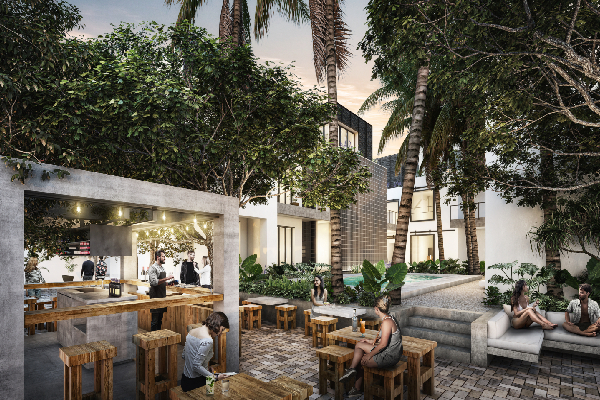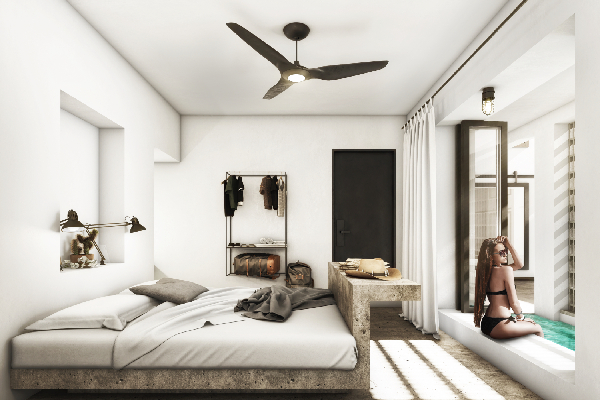TMC Hospitality announced 10 days ago that it is launching its second brand, Drift, with the first 29-room property set to open in San José del Cabo, Mexico, in November. The team led by Philip Bates also has plans to expand the Drift brand into Santa Barbara, California, and Nashville, Tennessee, in 2022.
Similar to TMC Hospitality’s Bode brand, the more upscale Drift brand is also catering to “social group travelers” with edgy minimalistic design, locally sourced décor and immersive experiences. Amenities in San José del Cabo will include a mezcal bar developed in partnership with Mezcal Exiliado and a local taco truck accompanied by live music in the courtyard.
HOTELS caught up with TMC Co-Founder and CEO Bates to learn more about plans for the newly launched Drift brand.

HOTELS: Can you share more about the potential growth for the Drift brand in next one to three years?
Philip Bates: We have been very active trying to grow our pipeline. We will open Drift Mexico in November; Drift Santa Barbara opens in Q2 2022; and Drift Palm Springs and Drift Nashville open in Q4 of 2022.
We are actively underwriting and working on projects in the southwest and southeast regions of the United States.
H: Who owns the first Drift property and the 2022 planned properties?
PB: We own the first Drift property and are investors in or owners of the other three Drift properties.
H: Will you continue to own and manage the Drift properties, or are you looking for developers and you take management?
PB: Over time our portfolio will be a blend of assets we own, have invested in or third-party manage. Currently, we invest in or own all of the hotels we manage but as we scale we hope to do more pure third-party management contracts.
H: What are the development costs?
PB: Development costs vary market by market, but we generally bring our assets in below the cost of a typical boutique hotel. We do this through a unique acquisition strategy wherein we try to buy below market and then we look to reduce time and costs through some of our design and FF&E strategies.
H: Can you share more about new development versus conversion opportunities for the Drift brand?
PB: Conversions are often viewed as a little less risky by capital so they are easier to acquire and generally come to market a little quicker – though not always. They are also sometimes more creative in the sense that you have pre-existing conditions that you need to work with and maneuver around. That is part of the fun and excitement of conversions, but it also can be a source of stress and anxiety in that it is harder to forecast time and cost to convert because there are many unknowns.
New builds, on the other hand, are viewed as a little more risky by capital so are harder to put together and generally take longer to bring to market. But once a new build does come together, generally one is able to produce a more intentional product. I love them both and am glad we have a mix of the two. In the current environment, we are looking at more conversions because capital is generally looking at the market conservatively, but we have started to see some interesting new-build projects come our way and we do expect new builds to return to the market in the coming years.
H: What is the projected ADR for Drift?
PB: Similar to the cost to build, this varies by market, but generally we are in the US$200s.

H: What has been the biggest challenge in developing the Drift brand and/or the soon-to-open hotel in Cabo?
PB: As obvious as it may sound, the biggest challenge has been COVID. It brought about a litany of issues, some foreseen and others unforeseen, that we had to navigate through. RevPAR had historically low declines while labor costs went up. Cost to build and renovate also went up. Travel restrictions and varying COVID levels of cases created many false starts. In person meetings to review construction or brand progress were delayed and at times restricted. It was a real challenge. But as with anything, it is the challenges and difficulties that ultimately strengthen people and organizations and I am proud of the way our organization navigated through these times and Drift is better for it having lived through them.
H: What is the biggest differentiator of the Drift brand that we haven’t heard from 10 other brand developers in the last year?
PB: I would say there are a few differentiators:
The first is we are very low on labor and high on technology. Therefore, when you come to a property, you will certainly notice less staff than a normal hotel. That said, our technology makes the guest experience seamless and the team members we do have on site are expertly trained to deliver best in class hospitality. We recruit people who have a passion for doing something new in hospitality. We train and incentivize them to do more with less and the combination of this model and our technology causes the guest to receive more personalized attention and a have higher quality experience.
The second is our room types. We offer regular hotel rooms as well 2- 3- and 4-bedroom units. This enables us to cater to traditional boutique hotel travelers as well as what we refer to as the ‘social group traveler’ such as friends, families, colleagues, etc. This additional room type offering and guest demographic tend to give the properties a more energetic feel than your normal hotel as energy is generally higher when traveling in groups versus when traveling alone.
The third is our food and beverage offering. We have a very distinct perspective on food and beverage in that we offer limited yet very high-quality items. Generally, this will be a craft coffee shop, cocktail/craft beer and wine bar and a very limited but tasty food menu. We do not have traditional restaurants and do not offer any kind of room service. So, guests will generally have breakfast and afternoon drinks with us throughout their stay and will certainly want to try one of our limited yet scrumptious food offerings – street tacos, handmade pizza, etc. depending on location – at least one time during their stay.
Lastly, I would say we deliver little moments and experiences that we as travelers want. Our picnic and surf offering in Drift Mexico is an example of this. It is not uncommon for hotels to offer surfing lessons or surfboard rentals. But we put our unique spin on it and offer guests the ability to take out one of our surfboards and drive to a hidden local beach and surf on their own. We equip them with a surfboard, surf rack and a picnic basket which can include things like sparkling waters, cubanos, a Bluetooth speaker, etc. They then can go have a unique experience on a local beach that feels less mass produced than a traditional hotel surfboard rental program. We view this kind of experience as something that is guest driven rather than hotel driven and you will find such things at all of the Drift properties. Think of it as experiencing a city the way you want to versus the way the hotel wants you or organizationally requires you to.

